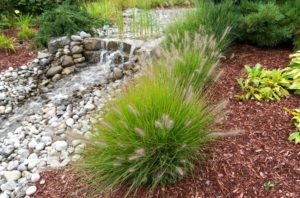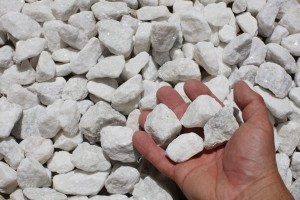Evaluate the attributes of bark or rock and choose the right mulching alternative for your garden
If you are looking for mulch, you have plenty of resources at your disposal. The mulch you choose for your garden can have a significant impact on the appearance and the cost of landscape maintenance. Bark mulch is commonly used in flowerbeds and garden beds, and to protect ornamental plants. Stone or rock mulch, on the other hand, is predominantly a crushed stone and is popular along walkways, driveways, and around buildings.
Bark Mulch
This is the most common and inexpensive type of mulch, made from shredding the bark of trees. Bark mulch is a product of many different trees, the most common of these being cedar, cypress, pine, oak, and hemlock. Ask Melvin Mulch to explain the differences and benefits between various types of trees.
Bark Mulch Benefits
Bark mulch has numerous advantages. For starters, it is very economical since it is relatively inexpensive. One person using a shovel can easily apply it. Bark shredding brings organic matter and nutrients to the soil when it decomposes. Shredding the bark of different trees give a variety of hues and shades and is vital for edging the flower beds of any residential garden. Due to the cover of the mulch, the soil retains moisture better, allowing you to save water. Bark mulch also helps to insulate plants, especially during cold winters.
Bark Mulch Drawbacks
Bark mulch has some characteristics that might make it unsuitable for you. Due to its decay, bark mulch needs to be replaced periodically. The hues and shades will fade and may no longer work to the beautification of your garden. Shredded bark could also be blown away by the wind or washed off by heavy rains.
Stone Mulch
Rock or stone mulch comes in a variety of rocks and gravel, such as lava rock, granite, quartz rock, river rock, and pea gravel, and in a variety of different shapes, sizes, textures, and hues. Landscape mulch does not decay or decompose and does not need periodic replacement, as is the case of bark mulch. The varieties of landscape stone available ensure that you achieve high the ultimate aesthetic value for your garden. Because rock mulch does not retain moisture, it minimizes the chances of fungi growth. The minimal maintenance of rock mulch has an impact on the overall expense.
Stone Mulch Drawbacks
Stone or rock mulch is more expensive than bark mulch, and heavier, making it harder to install. Its aesthetic value suffers if a large pile of leaves cover the mulch. It does not provide any soil-building benefits because rock mulch does not decompose. You might have to install a weed barrier to prevent weeds from growing through the rock layer. By using a weed barrier, you can avoid the proliferation of invasive plants.
When you want to buy mulch, the type of mulch you choose will greatly depend on factors such as landscape design, what plants you intend to grow, where the mulch will help, and the weather conditions in your area. Let the mulch experts at Melvin Mulch help you with your decision.

